(1985)
Directed by: Fruit Chan, Sammo Hung
Written by: Barry Wong
Starring: Emily Chu, Hoi Mang, Jackie Chan, Sammo Hung
AKA LONG DI XIN, THE FIRST MISSION
HONG KONG
AVAILABLE ON BLU-RAY AND DVD
RUNNING TIME: 96 mins/93 mins
REVIEWED BY: Dr Lenera
Tat Fung is a police officer whose wish is to sail around the world as a merchant seaman. However, he has to care for his mentally challenged brother Dodo who’s often taken advantage of and gets into trouble, and he’s also trying to balance his relationship with his girlfriend Jenny. He finds himself becoming increasingly resentful of his brother who takes up so much of his time and energy. Then Dodo accidentally becomes embroiled in a scheme involving gangsters and some stolen jewellery which winds up in Danny’s possession….
When the news broke that 88 Films were releasing this one on Blu-ray, I immediately began to look forward to watching it again and reviewing it. Heart Of The Dragon [the ‘The’ seems to be optional but I prefer it] rarely seems to be mentioned as one of Jackie Chan’s best movies. I guess this is first and foremost because it’s not an action movie [at least in the version most widely seen] or an action/comedy movie – it’s a drama, superficially similar to Rain Man which was made three years later, with some action in it, and that’s not what many folk watching a film starring not just Chan but his Peking Opera ‘brother’ Sammo Hung expect or indeed want to see. And when Chan does fight, he’s deadly serious and genuinely brutal, both of which are unusual or usually balanced out by some laughs or crazy stunts being incorporated in other films. And I also think that the way in which Hung’s child-like, mentally handicapped brother character is sometimes handled won’t sit well for some modern viewers, though I personally consider it to be both brave and realistic – and yes, I have known people like Dodo. But I almost fell in love with this one when I first saw it and loved it again when recently watching 88 Films’s Blu-ray, so I have no shame in declaring it to a film that belongs in Chan’s top five [no, I’m not joking]. It’s an honest, even painful, effort which refuses to soft-peddle its issues for PC purposes which it would no doubt do if it were made today. It contains top class acting from Chan and Hung. And it contains a climax which should be held up as a masterclass in how to do action cinema, from pacing to staging to cinematography; it’s that good.
One wonders why Yuen Biao chose not to appear before the camera [aside from some doubling including of Chan] alongside Chan and Hung considering how successful Project A and Wheels On Meals starring the three were; there are several roles that he could have played. Instead he did the fight choreography. But anyway Chan and Hung, possibly inspired by Of Mice And Men, wanted to do something very different, and I wouldn’t be surprised if the initial idea was to not have Chan fight at all. As it was, Golden Harvest kept leaning on Hung, who also directed with assistance from Fruit Chan, to give himself some fight scenes, but Hung held his ground, saying it would be ridiculous for the character he was playing. Then, when the film was completed, he did something that was on the surface very odd – feeling that they interrupted the flow, he cut two fights from all versions except the Japanese one which also contains some outtakes, one of which shows stuntman Chung Fat being kicked through a window, falling off the second story, missing the awning he’s supposed to bounce on, then missing the car he’s supposed to land on, hitting the ground and getting hit by the car to boot! The Blu-ray also contains the version with the cut fights, and I can’t decide which version I prefer. The first occurs near the beginning and features Chan battling a gang led by martial arts movie veteran Lau Kar Wing when a hospital he’s taking his prisoner to has been taken over by crooks. The second, about a third of the way through, features Chan and his police colleagues battling a gang lead by legendary bad guy Lee Hoi San. Both are great, and you can tell that they’ve cut the second fight while watching the film. However, Hung’s director’s cut is the one with the fights removed, and, while can’t believe that I’m saying this, you could say that the fights aren’t needed at all! Box office was disappointing – it made money, but much less than expected – and Chan, apart from the slight variation of Dragons Forever, stuck to type for ages afterwards.
Chan’s character Fung is first seen in a strange yellow combat outfit in some forest, seeing a hand grenade being thrown in front of him and shouting to his comrades to move. There’s talk of hostages, Fung machine guns someone who puts his hands up and breaks a neck [both uncharacteristic for Chan], and briefly fights with Mr. Vampire’s Lam Ching Ying [sporting odd eyebrows] before it’s revealed to be a training exercise. Fung is promoted to CID officer, though girlfriend Jenny, much like Ka Kwi’s long suffering May in the Police Story films, feels ignored. She also wants him to propose. However, so much of Fung’s time is spent on brother Dodo, introduced playing with his kid buddies. Now I wouldn’t be surprised if some viewers and certainly some critics today would find it creepy the way this adult hangs out with kids, even though it makes sense because Dodo is much like a kid himself and is therefore, to me, totally innocent. They all go into a restaurant and order a big meal because they think they have enough money, but in fact Dodo mistook the paying of a tip by a couple to be the actual price, so he gets beaten up by the staff when he can’t pay and escapes into the kitchen to lock himself in a freezer, causing his brother to have to crawl through some air ducts to get to him – and ending with the sight of Jackie carrying Sammo which must have been some feat. It’s the first of several uncomfortable scenes in which Dodo is used and abused by those around him, even the children, even for goodness sake the supposedly kindly aunt who, when trusted to look after him when Fung is off to go sailing, tries to wiggle out of buying Dodo his favourite meat, pork. I think that ‘snowflakes’ would complain if such moments were included in a film today, people who would rather pretend that disabled people are always treated well in society – okay things are far better than they were in 1985 but could be better still. It’s entirely right that these bits were included, and that they make us feel angry.
Even though, as I said, you can tell when the second deleted fight scene, prompted by Jenny, a waitress, being harassed by some customers, was removed because there’s a clear build-up to a brawl, the film does work fine being just a drama for the first half, before gradually becoming faster paced and slowly bringing in more action when we’re introduced to a robbery of a jewelers. The police surprise them, but one of them gets away with a bag of jewellery, to be surprised again by Dodo pointing a toy gun at him. This causes him to drop the bag and flee, and Dodo to hide it. A series of events cause Dodo to be both wanted by the cops and kidnapped. After a decent if not outstanding car/bike chase – it’s cool the way the vehicles go all over the place but disappointing the way that oil removes the danger of all the bikes – we have Fung and his buddies arrive at a construction sight to save Dodo from these gangsters led by familiar Lo Wei villain James Tien. We’re teased a little by focusing on the others, their action progressing from guns to fists, but eventually we’re treated to the sight of a truly formidable Chan acting as a genuine offensive fighter who has no time to mess about and is happy to kill to rescue his brother. He ruthlessly ploughs his way through bad guys with haste, putting things like a machete and a pick-axe to good use, before taking on Dick Wei in their fourth and best encounter [and sometimes having time to pummel Tien too]. There’s no setting the scene, no messing about – these guys just want to kill each other in a breathtaking display of speed, power and athleticism. Hung even uses the setting brilliantly, a damp, murky series of floors full of nooks and crannies out of which a bad guy can always jump.
The script makes sure that Dodo’s actions have a kind of logic to them – he sees fish swimming underwater, so he puts his head in his bath water to teach his rubber duck how to do the same. One is indeed invited to laugh at certain moments, such as when he’s asked by one of the kids to pretend to be his father, but the only thing I remain slightly uneasy about is the way that Dodo dresses in dungarees like a baby, it’s hard to believe that Fung would clothe him like this. Yet Fung is not always that sympathetic of a character, at comes seeming selfish. An early scene where he listens in on a teacher horribly putting Dodo down is revealing; he doesn’t go straight in and tell the teacher to stop. He may care for Dodo, but sometimes seems embarrassed about showing it, such as when the two are walking around holding hands and, in reaction to people laughing, he just mechanically repeats “he’s my brother” over and over again. Eventually he loses control and verbally takes out all his frustration out on Dodo in an incredibly powerful moment, then when his friend Tan tries to tell him about his responsibilities, Fung turns around so he has his back to Tan and puts his hands over his ears. And Dodo truly breaks your heart several times when he tearfully says that how much he wants to learn. Yet it’s all very well for us to judge Fung, but many of us aren’t in his situation and are therefore not really aware of how difficult having someone like Dodo for a brother could be. Likewise, one can sympathise with Jenny who has a boyfriend who seems to not only be against committing [his half-hearted proposal is one of the film’s most subtly telling moments], but who spends more time with his brother than her.
Chan and Hung are totally committed to their characters [you’d never guess that Chan was known for being more comedic], while their chemistry together is in full flow. The set design includes little details like plaques stating the time in some of the world’s cities on one of Fung’s walls. One feels that a great deal of effort was made to produce a quality film full stop. Only the music score, credited to three people -Violet Lam, Clavin Poon and Sherman Chow, doesn’t quite fit at times – while containing several themes, the Canto-pop-style arrangements feel rather too light and the placing sometimes seems random. The Japanese version features two extra songs sung by Chan, the first one playing incongruously over the opening sequence with translated lyrics like, “China Blue, you’re like a baby doll, all the pretense of an adult”, the second over the end credits. And only the Japanese and Hong Kong versions have the theme that plays over the final montage with singing over it, yet it’s better with the song. To hell with accusations of sentimentality, it’s totally earned sentimentality by now. Things don’t magically conclude happily after Dodo is rescued as you’d expect them too; instead, Fung and company have to pay for breaking the law and spend some time in prison [cue a fantastic shot of Fung in his cell, one half of him including his face shrouded in black], while Dodo patiently waits, but now not so alone as before. Far from seeming sickly, the use of the song just reinforces the film’s themes of brotherly love and responsibility, and how vulnerable the mentally challenged are, and how much they need care and understanding. And, despite the brilliance of the action, that’s what we think of more as the end credits come up. While it certainly does have its fans, Heart Of The Dragon is really an unsung minor Hong Kong classic.

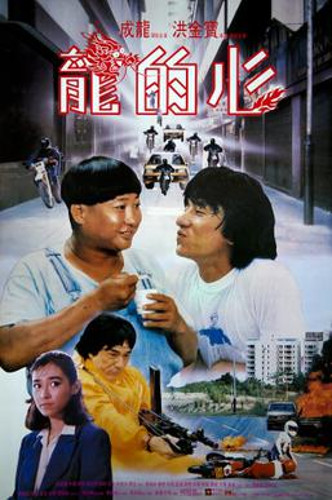
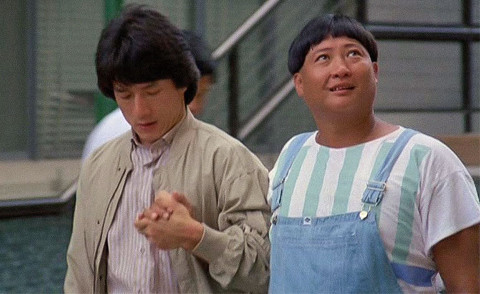
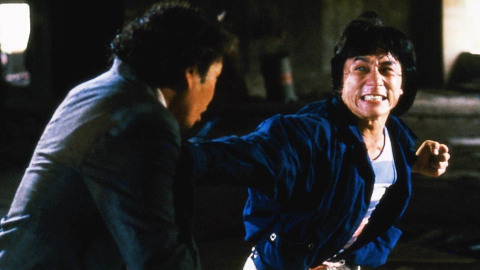




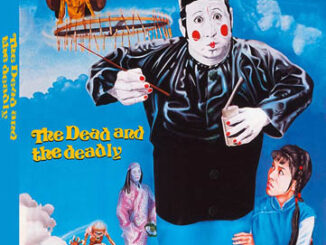
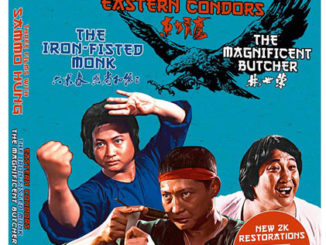
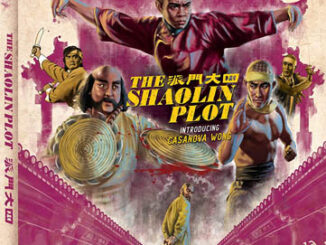
Be the first to comment